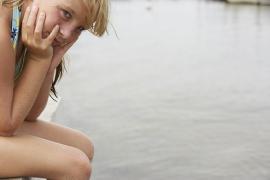Summer is just around the corner, which means it’s almost time for summer camp! Growing up, I spent my summers at a three-week sleepaway camp on the Oregon Coast. It was where I learned to love the outdoors, met lifelong friends, and fostered a sense of independence for the first time.
While it’s all fun and games for the campers, counselors (and parents) know the unique challenges faced at camp and the need for safety. Here are some common topics that are encountered at summer camp, with some information and tips to consider as you prepare for this coming summer.
Basic First Aid
First aid is as much a mindset as it is a skill set — recognizing the signs and symptoms that someone needs help, and empowering you to be a first responder when minutes count. From cuts and scrapes to helping someone who’s choking, first aid can be a lifesaving tool until help arrives. You never know if or when you will need these skills, so brush up on your first-aid training before summer starts.
Basic wound care is probably the most common issue you’ll encounter. The key principles for taking care of wounds are:
- Manage the bleeding by applying direct pressure.
- Wash the wound with clean water to flush out debris and bacteria. This is best done with a sports water bottle with a nozzle, which can deliver similar water pressure as the medical irrigation devices you might find in the emergency room.
- After the wound is cleaned, protect it with a bandage. Keep it clean and monitor for signs of infection.
While this is the basic idea, cuts, scrapes, and wounds can range in severity. And depending on where it is or how bad it is, can determine how you go about managing it. All of these nuances and steps for each situation can be found in the GOES Health app, right in time, when you need it most.
Insect Bites and Stings
There are many bugs out there that could leave you with itchy or painful skin reactions. While they can be uncomfortable, these bites and stings are rarely dangerous. You can manage the bite or sting with:
- Cool compresses or running it under cold water
- Anti-itch cream
- Diphenhydramine pill (Benadryl)
Of course there are times when bug bites and stings can be dangerous and life-threatening. Watch out for:
- People who are allergic to bees, wasps, or ants and might experience anaphylaxis when stung. Make sure they have an EpiPen with them and that someone knows how to use it.
- Poisonous spiders (like the black widow or brown recluse), whose bites may require evacuation and antivenom from a medical facility.
- Bugs that can transmit infections or diseases (such as ticks). These illnesses can take up to a few weeks to develop and can be very serious, requiring medical attention.
Download GOES to get the full library of which bugs to avoid and what to do if you encounter them.
Heat Illness
We’re coming off the hottest year recorded, and it’s just going to get hotter. It’s more important than ever to keep you and your campers safe in the heat by understanding how the body cools, avoiding high-risk situations, and recognizing key symptoms of heat stroke.
Sweating is one way your body keeps cool — through evaporation. When sweat evaporates off of your skin, it takes energy (heat) from the body and helps you cool down. Have you ever noticed how it feels hotter in humid weather? That’s because when there’s too much moisture in the air on humid days (especially humidity above 70 percent), it slows down the rate of evaporation. When your sweat doesn’t evaporate, you lose out on that cooling process.
Recognize the signs of someone who is overheating.
- Heat exhaustion: dizzy, nauseous, feeling weak
- Heat stroke: In addition to the above symptoms, they’re also confused or experiencing an altered level of consciousness
- Don’t be fooled: You can’t tell if someone is experiencing heat illness based on whether or not they’re sweating.
If someone is overheating, it’s best to cool their body as quick as possible. The most effective method is cold water immersion — the colder the better — while keeping their head and shoulders above the water. In less extreme cases, you can slap chemical cold packs (not ice packs) on your palms, cheeks, and soles of your feet. Packed with blood vessels that are situated closer to the skin, these spots act like radiators in a car, dissipating heat faster than any other area of the body.
Communicable Diseases
A communicable disease is an illness that spreads through contact, contaminated surfaces, through the air, or through body fluids. The most common cause is viruses. Viruses love to spread and are the usual cause of outbreaks of coughs, colds, vomiting, diarrhea, and rashes. If you see the same set of symptoms in multiple people, it is usually from a viral communicable disease.
While we all know the benefit of masks and social distancing to minimize the spread of viral illnesses, there are simple steps you can take to prevent their spread:
- Wash your hands! Use soap and water or sanitizer after using the bathroom and before preparing food to eat.
- Go to the bathroom at least 200 feet from camp.
- Avoid wearing shoes inside your sleeping area — they can track invisible bacteria from the bathroom.
- Properly refrigerate, store, and prepare your food to prevent bacterial overgrowth.
- Filter, boil, or disinfect any water you find outdoors before drinking.
Making sure a bunch of campers practice good hygiene can be hard! Do what you can to make it part of the camp culture so it stays as healthy and safe as possible. And that’s what the GOES Health app was made for — to be your pocket guide to outdoor safety — so that you and your campers can have the best summer ever.
Have fun and stay safe.
Dr. Grant Lipman
Chief Medical Officer, GOES Health
This blog is sponsored by GOES Health.
Periodically, the American Camp Association (ACA) makes timely and relevant information about products and services available to its members so they can make informed decisions for their camps. However, the ACA does not endorse products, services, or companies.
The views and opinions expressed by contributors are their own and do not necessarily reflect the views of the American Camp Association or ACA employees.



